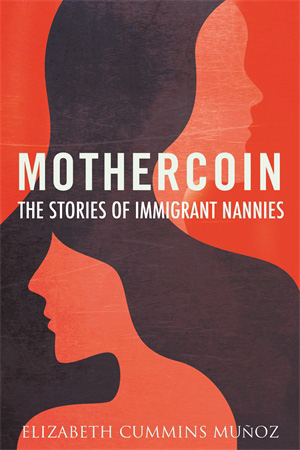Excerpt from Mothercoin: The Stories of Immigrant Nannies
Elizabeth Cummins Muñoz
When Magdalena was nineteen years old, she arrived at her aunt’s doorstep in Houston carrying little more than uncertain hope and the ambiguous memory of a South Texas beach and a border agent’s apartment. By the time she was twenty-three, folding laundry in my neighbor’s living room, she had married a fellow unauthorized immigrant from El Salvador, given birth to two young daughters, and cleaned the houses of a number of American families. Watching her work as I awkwardly pull an item or two from an overflowing laundry basket to fold as I listen, it’s hard not to be struck by her beauty, the graceful lines from jaw to hip, the bright symmetry in her brown eyes and cascade of chestnut hair. The tale of the border agent and the movie theater lingers, and even as she launches into stories of demanding bosses and the injustices of her experience as an unauthorized immigrant in this country, the memory of her crossing persists. It will bleed into the conflicts she recounts—her defiance before an unreasonable employer, her submission in the face of a dominating man.
By the time we talk, Magdalena has learned a thing or two about living in the shadows of American society. More than anything else, she explains, it means work and fear. Work, which earns her enough to buy her daughters baby dolls and send them to a school with computers, to wire money home to a loved one in an emergency. And fear, the constant threat of deportation and immigration raids at a disco, a bus stop, her husband’s work, so pervasive it moves her to warn the girls, “Take care of your things. Treat them well, because from one day to the next we might be back in El Salvador.”
But in the end, the wages trump the fear. “In this country, when there’s work, there’s hope. There are so many women,” she adds, pausing to shake out a pair of tights and dig for a matching sock, “who come to this country just to find one day of work.”
Magdalena has worked for many days, for many kinds of women. Her experiences have all been different, but one truth holds across the families she has encountered: American children require a lot of attention. “The time and patience that I put into taking care of my two daughters, even four kids, that’s how much time you need to care for one American child. And watching three American kids is like caring for twelve of your own. Everyone knows that American kids are really sensitive, and they need a lot of care and attention because they’re your responsibility from the moment they’re left in your care.”
I wince, finding myself on the other side of Magdalena’s observations—how fragile my children seem, how fully they must therefore need me. Our perceptions of childhood and motherhood are deeply intertwined. The one creates the other. In the American middle-class world of turn of the twenty-first-century motherhood I’ve known, the sense of childhood as fragile and inviolable reflects a climate of political stability, social privilege, and a mandate to social class reproduction that focuses on nurturing and educating children well into young adulthood before sending them out into the world of white-collar competition. These delicate, attention-hungry children are the social and cultural purview of the mother, who must therefore be a constant force moving before and about the child as a buffer to the world outside. So too, her hired replacement.
In Madgalena’s experience, the American child’s peculiar sensibility has something to do with the tendency of the American patrona to watch a caregiver’s every move. “I’ve worked with so many people,” she reflects, “and the experiences are very, very different. I’ve worked with señoras who spend the whole day with the kids and with me, and they don’t make me uncomfortable at all. Because they don’t say ‘look, do this, or do that.’ I just figure out how they’d like me to do things and I do it. But I’ve had others who won’t leave even for half an hour, like they’re desperate to be at the house.”
It’s a question of style, then. Of age and social class and personal histories. Each relationship unique, within a balance of power that always tips in the employer’s favor. But Magdalena insists that she was no pushover.
“When I don’t like something, I say so.”
These confrontations, she tells me, would go something like this: “You know what?” she’d say to an overbearing employer. “It makes me uncomfortable that you’re here because you don’t let me work the way I want to. And if you don’t try to be a little more in the background, I’m going to have to stop working for you.”
“I make you uncomfortable?” they’d say. “But why?”
“Because you’re watching everything, always following behind what I do and watching how I clean and how I do things.”
“Oh. Well,” the patrona might respond, “if I’ve made you feel this way, I’m sorry. It wasn’t my intention. I’ll try to change a little.”
And Magdalena, resistant and in the right, would emerge victorious. A woman like her may only have a few cards in her pocket to play in the game of power and choice, but when she’s the sole author of her own story, she gets to lay them out with a fierce kind of dignity.
“Look,” she recalls saying, “I know that you’re the boss and I’m your worker, and I don’t want to argue with you, but the truth is simply that I don’t like how you’re being and I don’t feel comfortable. So I’m going to have to quit this job.”
Not all of Magdalena’s employers forced these uncomfortable confrontations, though. In some homes, free of constant vigilance and instruction, she felt free to make her own choices about how to do her work without judgment. That’s how it was with the good patrona, the soft-spoken woman with the children whom Magdalena briefly loved.
When she started with this family, the children were quite young and Magdalena soon came to feel real affection for the baby and toddler, and for their mother as well. Like other “good patronas,” this woman gave her employee the freedom she needed to do her job well. For Magdalena, this meant communicating expectations clearly. “Look,” the woman would say when Magdalena arrived in the morning, “today in general I want you to help me with these three things. If you can’t get to the rest, that’s okay, but I need you to make sure you get these three things done.”
This kind of direct communication about job expectations ranks high on a professional domestic worker’s wish list. After dignity and respect, what workers say they want most is for the work to be treated as a legitimate job and for the worker to be given control over the work process. The need responds to a prevailing sense of domestic labor as a private affair, an offshoot of femininity that is managed in knowing gestures and unspoken assumptions. “Of course, housecleaning includes laundry,” an employer might assume. “Certainly, looking after the children means changing their sheets—every Monday, just like it’s supposed to be done.” When the work is treated as work and recognized as legitimate employment, written contracts can replace assumptions like these, performance reviews might resolve tensions, and an employee could have the chance to respond, “I’d be happy to change and launder the sheets—for twenty dollars more a week.”
For Magdalena, the scope of her work with this family was clear— these three things, the daily work of a home with two young children, and two standing expectations. Magdalena laughs when she recalls the señora’s reminder, “Make sure my husband’s boxers are in their place, and the children’s pajamas. Make sure that’s done before you go.” Her face and voice soften as she offers this memory, eyes steady on her deftly folding fingers.
Magdalena worked three eight-hour days a week for this family. When she started, the baby was only a few months old and the older boy was still small and affectionate.
“I had to put the little one to bed before I left each day,” she smiles. “He wouldn’t go to sleep on his own if he knew I was there. He’d rather stay with me than go with his mom. When his mom told him that I wasn’t going to be working for them anymore, he said no. He didn’t want anyone else but me.”
The señora didn’t want anyone else either, but their careful domestic balance could not sustain the contrary desires of each woman’s husband. The señora explained to Madgalena that her husband insisted that their nanny have more flexibility.
“They trusted me,” Magda insists, “the parents and the kids. They were very endeared to me. The woman even told me, ‘If it wasn’t that my husband wants someone full time, seven days a week . . . I don’t want you to go, but well, I can’t go against my husband.’ ”
Magdalena explains that it wasn’t the seven-day commitment her own husband protested, it was the late hours. “They wanted someone who could be there on Saturday and Sunday so they could go out. And since my own husband won’t let me work at night . . .” Her voice trails while she finds the words to help me understand. “My husband thinks only bad women work at night, mujeres malas.” She pulls a bedsheet from a pile of linens and flips it sharply in the space between us, folds it against her chest and thighs, once in thirds, and then again. “My husband is very machista,” she explains.
Magdalena assumes that I’ll understand the word machista the way she does. Maybe she means to say that machista men are overprotective. Or that machista men are overbearing. Or that machista men are always jealous or suspicious. In any case, for her, machista is explanation enough as to why a man would think that night work is for bad women. I can’t say if Magdalena intuits what I do about this sentiment, how it feeds into a perception of womanhood that allows for few options and no morally virtuous power.
In the machista meaning system that I’m familiar with, a good woman wears the saintly veil of the sexless mother, epitomized by the Virgin Mary; the bad woman is both oversexed and a traitor to men, the blameworthy Eve. Everywhere this Madonna–whore dichotomy surfaces, from Magdalena’s rural Salvadoran hometown to the pages of Nobel laureate Octavio Paz, its purpose is to shame a woman’s power—her work, her sexuality, her agency in a public world. When the mujer mala is invoked in the machista context, it is associated with the mujer pública, the shameless prostitute. How dreadful it must be for Magdalena’s husband to be a machista man in the emasculating world of the unauthorized immigrant. How necessary to control the pretty wife with the auburn hair. How important to dominate and protect, to be a man.
So for me, the word machista offers its own explanation for why Magdalena’s husband made her quit her job. It has to do with a power dynamic that is unfair, some might say unjust, maybe even shamefully oppressive. But I am not the one who said goodbye for the last time to a little boy in fresh-pressed pajamas because of my man’s machismo. I am not the one who needs to weave it into a personal story of defiance.
“So, what’s your perception of this, your reaction to it?” I ask about her husband’s prohibition.
“Simply that he’s the one who works and provides for us. He can tell me if I can or can’t go.”
“But you work, too, right?”
“I work to help him, but if I can’t, he does it all.”
Like Rosa’s fifty dollars against her husband’s $350, a man’s work counts more, even within the intimacy of Magdalena’s marriage and her own perception. But where Rosa’s labor was devalued in currency, Magdalena’s is short-changed in power. The implications run deep.
Magdalena first met her husband in a laundromat. They flirted over the sounds of tumbling dryers and the boisterous exchanges of other migrants moving in and out of the machines’ rumble in Spanish accents both familiar and strange. He was Salvadoran, too, a recent immigrant like her. She must have been barely twenty. As their relationship progressed, she learned of a girlfriend he had back home and protested that he spent all his free time at his sister’s, on the phone with his “ex.” It was a double life common among immigrant men, one lover here, one lover there. Magdalena complained, but he kept it up. She yelled, but he accused. To keep the peace they simply stopped visiting family—no more time spent at his sister’s house, no more visits by Magdalena to the aunt who had taken her in. And it’s true that, with all the work and so much fear, there was little time to make friends. And Magdalena would have liked to attend church services, but her husband says she only goes to catch a man, not to praise God.
“So, to avoid problems,” she concludes, “I try not to go against my husband.
Excerpted from Mothercoin: The Stories of Immigrant Nannies by Elizabeth Cummins Muñoz (Beacon Press, 2022). Reprinted with permission from Beacon Press.
Beacon Press books are available at all retailers, and here:
 Elizabeth Cummins Muñoz holds a doctorate in 20th-century Latin American literature, specializing in Mexican and US Hispanic studies and women’s studies. She is a lecturer at Rice University and lives in Houston, TX, with her family.
Elizabeth Cummins Muñoz holds a doctorate in 20th-century Latin American literature, specializing in Mexican and US Hispanic studies and women’s studies. She is a lecturer at Rice University and lives in Houston, TX, with her family.
©Literal Publishing. Queda prohibida la reproducción total o parcial de esta publicación. Toda forma de utilización no autorizada será perseguida con lo establecido en la ley federal del derecho de autor.
Las opiniones expresadas por nuestros colaboradores y columnistas son responsabilidad de sus autores y no reflejan necesariamente los puntos de vista de esta revista ni de sus editores, aunque sí refrendamos y respaldamos su derecho a expresarlas en toda su pluralidad. / Our contributors and columnists are solely responsible for the opinions expressed here, which do not necessarily reflect the point of view of this magazine or its editors. However, we do reaffirm and support their right to voice said opinions with full plurality.
Posted: June 16, 2022 at 9:22 pm











